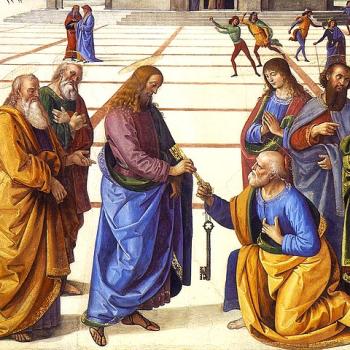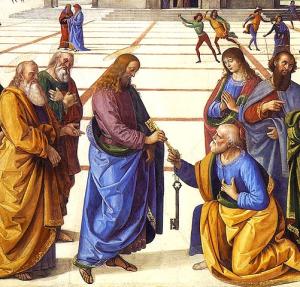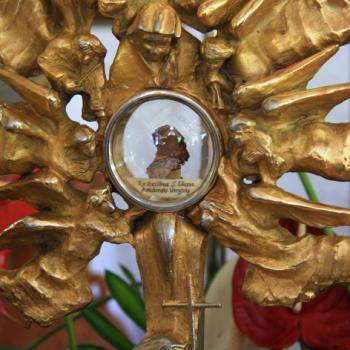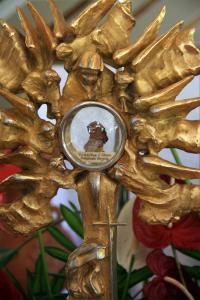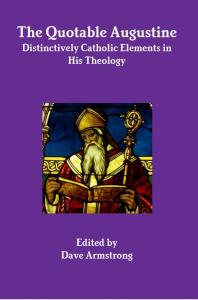[originally from 10 June 2007]
***
Reformed Baptist John Knight’s words will be in blue.
See these articles that are referred to in the exchange:
Critique of Van Til’s Presuppositionalism [10-23-04]
Critique of Presuppositionalism & Greg Bahnsen [4-14-07]
*****
I would describe myself as a Reformed Baptist, following broadly within the Van Tillian tradition, especially as developed by Greg Bahnsen on the one hand & John Frame on the other. (Both were students of Van Til.) By common consent, Dr. Van Til was a poor writer, one whose sparkling analogies sometimes appeared in the oddest places. And, no doubt, there are additional issues, clarifications, & corrections to be addressed by Christian thinkers to day & in the future. However, it is worth noting that Van Til’s writings anticipated many of the important developments in 20th Century philosophy. The challenges posed by Wittgenstein, Kuhn, Quine, Sellars, Polanyi, & Plantinga to “modern philosophy” support Van Til’s general critique of unbelief.
Thanks for your cordial remarks in the Open Forum.
. . . Assuming, of course, that you really want to get into some of the more interesting questions in the debate.
Absolutely! Good dialogue is an increasingly rare commodity these days. How refreshing to find someone who seems to enjoy it as much as I do, and a nice guy to boot!
As to Mr. Armstrong’s comments on Dr. Bahnsen’s article, Mr. Armstrong returns repeatedly to the claim that Bahnsen is presenting a Straw Man of evidential apologetics by accusing evidential apologists of neutrality. This criticism appears to be Mr. Armstrong’s core complaint, which he repeats throughout the article.
I don’t claim to be an expert on Bahnsen. I was simply responding to the best of my ability, to what I understood his arguments to be. Sometimes one can make further assumptions about opponents’ underlying premises that are mistaken. We’d have to go through my replies and see where our differences lie.
And please call me Dave!
To that extent, I do think that I have interacted with the substance of his comments.
Not if you haven’t gone through my reasoning point-by-point, as I am doing presently. You don’t know if you have misunderstood some of my arguments or misconceived the premises lying behind them. We’re all prone to that mistake (and usually unintentionally) . It’s always good to look at the actual particulars of someone else’s argument rather than make broad, grand assumptions which may be mistaken in part or wholly.
I hope I have done so politely & amiably.
Yes; I greatly appreciate that, as I am sick to death of completely unnecessary hostilities simply because people have some honest disagreements. I’ve never fully understood that, and I don’t think I ever will.
[I]t is possible that our disagreements can sorted out through a simple clarification of terms & issues.
I think that is a distinct possibility, once you fully understand my overall outlook on apologetics and philosophy. Several indications of common ground have already appeared, as I responded (below). I can tell by the people you cite (Plantinga and Polanyi, whom I love and have been highly influenced by, Kuhn, etc.; Cardinal Newman: a profound influence on my thought, has been compared to Polanyi in several ways) that we are on the same page quite often. That doesn’t surprise me. It may not surprise you, either, but surely it shocks many who think that the divide in these areas is much bigger than it should be (i.e., we have much more in common than people think).
As a Reformed Baptist & recovering evidentialist, I find Mr. Armstrong’s reply to Dr. Bahnsen unsatisfying. He seems to misunderstand Bahnsen’s critique of attempted epistemological neutrality as an attack on the sincerity of evidentialists & “classicists.”
Okay; we’ll see!
Bahnsen is not attacking the good intentions of classicists & evidentialists. He is instead pointing out the futile nature of trying to prove the truth of Christian theism from non-Christian presuppositions.
This, of course, hinges on what one means by “prove”. I think there are relatively few things that one can absolutely prove. On the other hand, I believe in natural theology, which means that I think there are certain things that all men know intuitively or instinctively or with a properly formed intellect by virtue of logic, that Christians can then build upon in their apologetic.
What would be the basis of your argument?
My argument against Bahnsen is in my paper. I don’t recall all particulars without revisiting it (as I have written many hundreds of papers). As we get deeper into this, I’d like to see you examine particular arguments of mine.
Historical evidence of the Resurrection? Apart for Christian presuppositions, one can never prove that Christ rose from the dead.
I agree. I’ve never claimed that one could prove such a thing. I think Reginald stated it well in the same combox:
In the first place, the Catholic wouldn’t try to prove that Christ rose from the dead, if by “prove” you mean “provide incontrovertible evidence”. Some things must be accepted by faith. We can only remove the obstacles to that acceptance by demonstrating that the the faith is a reasonable thing – and that there are good reasons for being Christian (and Catholic).
Even if you succeed in convincing the unbeliever, he doesn’t have to conclude that, therefore, Christ is God. There are other options.
That’s right, though I do think most such people would agree that if the resurrection were “proven”, that this would constitute significant evidence towards the proposition that Jesus might, in fact, be God. They use the supposed implausibility of the Resurrection, precisely as a means to discount Jesus’ claims.
More generally, the facts do not speak for themselves. Facts only make sense within an interpretive framework, a point made by Ludwig Wittgenstein, Thomas Kuhn, and Wilfrid Sellars, among others.
I couldn’t agree more.
The Kalam Cosmological Argument? It’s based on a fundamental misinterpretation of set theory. And even if the math made sense, it wouldn’t prove the Christian God or even a personal god as the first cause.
I agree. What I have said is that it shows that theism is at least as reasonable as atheism. I think it is a very strong argument, though.
Even worse, the argument presupposes a linear view of time. What about the unbeliever who has a cyclical view of time, like many pagan religions?
One’s view of time doesn’t eliminate their burden of dealing with causation. I think the argument can be made, at least, that time is linear back to the big Bang. Before that, we can’t say (and the Christian can simply posit by faith that this was “eternity past” — before divine creation. But in any event, unless one is anti-science, they cannot escape the fact that present-day cosmology and physics require a belief that the present universe began in that instant of the Big Bang.
The Argument from Design? While I respect the work done by William Dembski & Michael Behe, they are the first to admit that, even if their argument is correct, it only proves design. It does not identify the designer: Terrestrial life could have been designed by non-carboniferous aliens.
I agree again.
More generally, do you propose to argue from “the facts” to prove the existence of Our Lord?
No, because I don’t think “proof” of such things is possible. It is only possible to create what I would call a “plausibility structure” whereby, as a result of cumulative evidences of various sorts brought to the table, the Christian view, or at least theism, is shown to be far more worthy of allegiance and reasonable than any alternative. In the end, faith will always be required. We can’t connect the dots of faith with reason, because that would undermine the very basis and necessity of biblical faith. They are simply two different things.
Do you begin with sense perceptions & experience as you ultimate foundation of knowledge & try build, brick by brick, a tower to the heavens, finally proving the existence of God? This philosophical approach is called “empiricism,” and it is self-refuting. It cannot prove the existence of God because it cannot prove anything.
It requires prior belief in the validity of sensory perception. I’ve written for 25 years that science requires faith to even begin. So this is nothing new to me. I accept Polanyi’s critique of empiricism. But in any event, I don’t think you can absolutely prove that God exists. This has been my position for as long as I can remember. One can have a very strong assurance of faith that He exists, and is benevolent. But faith is not reason. It ought to be not contrary to reason, but it ultimately transcends it, as another category.
Armstrong also seems to misunderstand Bahnsen’s approach as mere proclamation of the Word. A quick review of the Bahnsen-Stein debate will end that illusion forever. In that debate, Bahnsen tears down the atheist world-view of Dr. Stein. Stein had built his argument on a house of sand (his atheist world-view). When Hurricane Greg tore through the auditorium that night, Stein was left without any basis to criticize or even doubt the Christian world-view, and most of the audience saw it.
I understand that presuppositionalism is about questioning the premises of opponents. I highly relate to that because my usual methodology is socratic. I do the same thing all the time (and become very unpopular in some circles for doing so, believe me!). So what I did to presuppositionalism (in my first major paper on it) was to subject it to the same treatment that it gives to others, by examining its presuppositions. And, of course, it turns out to be radically circular, which is unacceptable.
Bahnsen, by the way, recorded a sermon or lecture on the Paul’s Mars Hill presentation. He makes a good case that Paul was a presuppositionalist.
perhaps you can outline that argument as we proceed. I’d be interested in seeing it. I think all Christians should have much in common, epistemologically, and we often do far more than we imagine. Note above, for example, how many times I agreed with your own premises and major aspects of your approach to questions of proof and apologetics.
I have two sets of questions…
1.) Are [you] claiming that there is no definitive proof for Christian theism?
If by that one means airtight rationalistic proofs that no sane man could possibly doubt, yes. That’s how I interpret the word “proof”: within the framework of rationalism and/or empiricism. But then I believe in the assurance of faith and the reasonableness of accepting God’s revelation in faith, based on a number of other supporting factors.
Are you claiming that your apologetic provides only probable proof for Christian theism? Or even some lower standard?
I think one can achieve a very high degree of certitude (Cardinal Newman’s word, I believe, in his Grammar of Assent) by revelation and reason together, as well as other things. I think there are many beliefs that are (in Plantinga’s terms) “properly basic” and perfectly plausible and permissible for rational people to believe. So, in sum, I think my evidentialist apologetic could provide an “exceedingly probable” basis for belief: as much as is humanly possible through reason alone (reason that men of all kinds can agree upon, based on the universality of logic, scientific method, etc.).
2.) Is this position the consensus at this website?
It’s my website, and my position, is as just described, so that is the position here! Commenters may show a spectrum on these matters. Catholics can have differing apologetics. I tend to combine aspects of different schools.
Please keep in mind that I never claimed that Catholics would use the historical argument. (I skimmed the index, and I didn’t see it presented on this site.)
I’ve written an entire book, Mere Christian Apologetics, that uses such arguments, in an attempt at a general Christian apologetic (not distinctively Catholic at all in that book). A second similar book, Christian Worldview vs. Postmodernism, tries the same approach, but geared towards atheists and agnostics.
I asked how a non-presuppositionalist proposes to vindicate the claims of Christianity, and summarized the inadequacies of three popular approaches, two of which do appear on this site, IIRC.
I have given a thumbnail sketch of how I do so.
Mr. Armstrong seemed to suggest that the presuppositional approach abandons argumentation for proclamation.
Sometimes it does do so, I think, either directly, or in effect or strong implication. In fact, one might argue that it must do this, insofar as it holds that believer and non-believer hold so little in common that they can scarcely communicate with each other (and incorporating the effect of Total Depravity or the unregenerate state).
That debate provides a clear counter-example to this misapprehension.
Perhaps. I’d rather stick to dialoguing with you at the moment.
Presuppositions are inevitable. One cannot even ask questions without relying on presuppositions.
This is correct.
The difference is between non-Christian presuppositions that lead to irrationality & contradictions
I agree.
& Christian presuppositions which provide solid foundations for knowledge, for reason, for induction, for math, science, moral obligations, language and so on.
Our worldview is coherent and consistent in all aspects of life. It doesn’t follow, however, that overtly “Christian” presuppositions are required for things like math and language.
~Ludwig Wittgenstein
I agree that the presuppositionalist can & should use “evidentialist” arguments. For example, he can present the historical evidence for the Resurrection, based on number & date of manuscripts, internal consistency, external consistency & so forth. Of course, the hard-core unbeliever will deny that this evidence proves the Resurrection. [Or maybe not. An existentialist might acknowledge the fact of the Resurrection without attaching any significance to it. Os Guinness recounts one such incident.] The apologist is then in a position to force the unbeliever to defend his theory of historical knowledge.
I agree. That’s exactly what I would do. I’ve done similar things many times in my numerous debates with atheists.
On the other hand, any argument that takes man as the ultimate source of knowledge is a rejection of divine authority. It is also dangerous to use bad arguments to defend the faith. It discredits the faith & leads to intellectual confusion.
Or, as the proverb has it, “Do not argue with a fool according to his folly, lest you become like him.”
[Proverbs 26:4-5]. I love this couplet of passages, with the one counseling the opposite of the other, so that the varied application depends on situation and prudence.
It is a pleasure to be welcomed into friendly disagreement.
Likewise; especially in light of certain criticisms from certain quarters that were not — shall we say — particularly gracious, to put it mildly . . .
As I pointed out in response to your analysis of an old article by the late Dr. Greg Bahnsen, “Bahnsen is not attacking the good intentions of classicists & evidentialists. He is instead pointing out the futile nature of trying to prove the truth of Christian theism from non-Christian presuppositions.”
That would have to be unpacked as to exactly what it means. I suspect that I could agree with it entirely or in large part, once it was elaborated upon in greater specificity.
Whatever other mistakes we may make, I hope we can all avoid attacking the good intentions of our brothers in Christ.
I don’t attack anyone’s good intentions or sincerity (and that applies to even my severest critics). It must be noted, however, that since Bahnsen was an anti-Catholic, he would not consider a fully observant, orthodox Catholic (such as myself) as his “brother in Christ” in the first place. And when that is done, it is very difficult for human beings to avoid being condescending, with such a huge category mistake in place.
I look forward to better understanding your apologetic outlook while helping you better understand my perspective & the outlook of my fellow presuppositionalists.
Yes; same here. How refreshing.
I think that the difference between us is, in some ways, probably much smaller than conventionally thought. In other ways, it is very large, but perhaps we can begin to bridge that gap.
I think so.
In my understanding, the key difference between the archetypal Presuppositionalist & the Evidentialist counterpart is not any particular argument. Evidentialists often use arguments that attack the presuppositions of the unbeliever.
I certainly do all the time, because that is what socratics do.
As noted above, C.S. Lewis used an Argument from Moral Law of that type in Mere Christianity & an Argument from Reason of that type in Miracles. (Whether or not Lewis deserves to be called an evidentialist, most evidentialists claim him as one of their own.) Likewise, I personally use a version of the Argument from the Resurrection, usually considered the sine qua non of evidentialist apologetics. Presuppositionalist Thom Notaro has even written a short book on the use of evidence in Van Tillian apologetics.
Duly noted.
What then is the difference? The real difference, I think, is the question of epistemological neutrality. When evidentialists like John Warwick Montgomery try to provide a defense of the faith on empiricist grounds — on the idea that the facts speak for themselves — they violate the old proverb, Even unbelievers like Wittgenstein, Quine, Sellars, & Kuhn can see the failure of empiricism to overcome basic problems in the theory of knowledge. Why build your argument upon the sand of unbelief?
One can do this on probabilistic and plausibility grounds. There is wisdom in using the opponents’ arguments and turning it against them. Paul urged us to do this and “become all things to all men.” It is ultimately only a methodological adoption of the opponents’ presuppositions (provisionally only), in order to show that they come to the end of thesmelves eventually, and that unbelieving views end in self-contradiction, utter incoherence, and despair.
The presuppositionalist rejects even the possibility of epistemological neutrality. Instead, he seeks to expose the necessary failure of all unbelieving philosophies & world-views.
I agree that they all fail. So I don’t see any great difference here. It seems to me that it is largely one of method.
This approach follows his understanding of another proverb, “Argue with a fool according to his folly.” By accepting arguendo the presuppositions of the unbeliever, he works to show that they lead to complete futility, undermining their own claims at the very outset of the conversation.
That’s exactly what I try to do with the atheist. But there are a lot of particulars to be dealt with in that overall endeavor. And to argue particulars there must be something held in common by both parties. Logic and widely-accepted scientific facts provide that common ground.
At the same time, the presuppositionalist offers the unbeliever the benefits which flow from acknowledging the fear of the Lord as the beginning of knowledge, wisdom, & understanding. He points to the riches of knowledge that are to be found in Jesus Christ. As Augustine put it, “Without belief there is no understanding.”
How does one have a discussion at all with someone, if one requires them to accept one’s own conclusion in the first place? That would mean that there is no rational discussion to be had at all, because in effect one is required to say, “you have to be a Christian [my position] before we can even begin this discussion”. So the situation reduces to blind faith from the outset, since the Christian cannot discuss anything with the atheist until the atheist first becomes a Christian (or, adopts Christian presuppositions, which amounts to the same thing, in terms of the discussion at hand).
When we look at Bahnsen’s debates, or those of some others, we can see from the example of very good presuppositionalist debaters that this interpretation of the Van Tillian approach is misguided. The approach is emphatically not to say, “You must accept my presuppositions before I will even talk to you.”
Rather, the approach is to show the unbeliever two things: (1) Unbelief leads to ignorance & irrationality.
I’ve been doing that for years, so we agree on that.
(2) The Christian world-view provides a foundation for knowledge. In other words: “Premise A leads to ignorance & logical contradiction. Premise B leads to logical coherence & empirical knowledge.” The actual work of demonstrating the cases is, of course, non-trivial.
Good.
***
Presuppositionalism reduces to, therefore, literally “anti-apologetics.” It undermines from the outset the very goal of apologetics: convincing the unbeliever in terms that he can relate to in order to have the discussion at all. We have to defend our viewpoints with something outside of themselves (reason and fact and experience); otherwise, no discussion is possible, because no reason can be given for our belief; therefore it is blind faith, as far as the observing atheist is concerned. I’m not impressed by such a method in the slightest. It accomplishes nothing.
If there is no objection, I would like to present a few selections from a conversation with some atheist friends to illustrate the form that this kind of argument should take.
Sure.
1. In my haste, I misquoted part of the proverb. I should say that the presuppositionalist tries to follow the proverb, “Argue with a fool according to his folly, lest he be wise in his own eyes.”
2. I’m still getting used to this format, so I missed the bulk of Dave’s very polite reply. But I am glad that we have as much common ground as we do.
3. Sometimes presuppositionalists do spend too much time proclaiming & too little time developing lines of argumentation. I have seen more examples than I care to admit: Such cases make me cringe. But bad examples of presuppositionalism should not blind us to good examples of that approach.
Fair enough. I would just add that if too many of these examples occur, I submit that perhaps it is because the premises of presuppositionalism inevitably lead to this sort of thing.
In fact, one might argue that [presuppositionalism] must [abandon argumentation for mere proclamation], insofar as it holds that believer and non-believer hold so little in common that they can scarcely communicate with each other (and incorporating the effect of Total Depravity or the unregenerate state).
I cannot, of course, speak for all presuppositionalists, but the teachers who have influenced me have taken a different approach. They instead emphasize the common ground that the believer has with the unbeliever owing to the unbeliever’s pre-existing knowledge of God as spelled out in Romans 1.
That is valid; however, the trick there is that your average atheist will not accept this, as it is already presupposing the truth of revelation, so it can be tried, but I am very dubious as to how successful it will be in convincing any atheist.
True, unbelievers have suppressed the truth of God in their rebellion against God, as a result of which their foolish hearts are darkened, and (though thinking themselves wise) they have become fools. We are even told that their speculations — their theories & philosophies — have become futile. The unbeliever is thus unable to justify his knowledge-claims. Hence, the unbeliever’s world-view is ripe for destruction.
The text doesn’t require us to conclude that absolutely every unbeliever is in express rebellion against the truth. I have argued that the very next chapter (Romans 2) presents a picture that suggests a great deal of goodness (from God) in some nonbelievers. Romans 1 is typical proverbial-type language of “universality” that was not intended to be taken literally. So both forms of Hebrew / biblical expression and context mitigate against this use of Romans 1 as an ally for presuppositionalism.
But the unbeliever still has a knowledge of God: so much that he is “without excuse” in the face of God’s wrath.
I agree, but usually this knowledge is buried deep under many layers of rationalization and disinformation, by which the person is burdened. He is often not even consciously aware of it. Men have a high capacity for suppressing divine truths and knowledge.
The unbeliever secretly relies on the knowledge of God when using math, logic, science, language, moral claims, and so on. We have common ground, not neutral ground.
One can distinguish between these two propositions:
1) Whoever does math, logic, science, language, and makes moral claims is ultimately relying on the inherent knowledge and presuppositions that God gave them [ability to reason, senses, presupposing basic tenets of knowledge and existence of ourselves and the universe, assuming the general “uniformitarianism” and predictability of life and nature, etc.], whether aware of it or not.
2) Whoever does math, logic, science, language, and makes moral claims must deliberately, consciously adopt overtly Christian presuppositions before it is even possible to do these things.
I wholeheartedly accept #1 and with equal vigor reject #2. Perhaps this might explain some of the discrepancy between us and cast light on where some confusion might be present in understanding each other. I also accept the following notion:
3) Math, logic, science, and language can be done and made starting with “religiously neutral” premises. The truth of 2+2=4 or e=mc2 or “if a=b and b=c, then a=c” or linguistics and syntax do not require adopting Christian presuppositions in order to be understood or applied to real life analyses.
For morality, I would argue that it is a fundamentally different case (and we would likely agree much more here), and that morality without a God of some transcendent sort is difficult to achieve in theory or in practice.
Take courses on those subjects [logic, science, mathematics, & history] in some school. One doesn’t have to start with Christian presuppositions to learn any of those things.
And here is where we really disagree.
For the presuppositionalist, the fear of Lord is the beginning of wisdom, knowledge, & understanding. Unbelieving men are able to be very good scientists, logicians, mathematicians & historians only because they have an innate knowledge of God that they suppress & deny in self-deception.
I agree in the sense of #1 above, but not if by this you mean something akin to what I described in #2. I am most eager to hear your response to this.
Unbelieving world-views cannot justify knowledge claims: they are nothing more than “empty deception” & “futile speculations.”
Ultimately, but often not in their initial stages. I’d have to see more specific examples to really unpack this adequately. We can only argue in generalities for so long.
***
The unbeliever unconsciously relies on his knowledge of God, but he has already engaged in self-deception to suppress that knowledge.
Oftentimes; not always. In fact, I would say this is self-evident, because some atheists do , in fact, become believers. Everyone is at a certain point on the spectrum between total atheism and committed Christianity. If an atheist is to convert to Christianity, say, 13 years from now, then God has moved him further towards the Christian end of the spectrum in six of those 13 years, moving toward the goal (in God’s Providence).
Therefore, such a person is relatively less hostile to Christianity and certain of its claims and assumptions after these six years, than he would have been before. God is moving him along, by His grace. Most conversions take place gradually, not suddenly. See, for example, C.S. Lewis’s accounts of his journey from atheism to theism and Christianity. Process; grey areas. It’s not a matter of his being totally wicked and then transformed into an angel of light when he talked to J.R.R. Tolkien and was convinced of the “true myth” of Christianity.
Now, if you accept this premise, then it means that many atheists (the ones who will eventually convert) are less hostile to Christianity than others, who are completely hostile and, indeed, examples of how you are applying Romans 1. Ergo: the passage cannot be applied with the absoluteness that you claim, by the fact of conversions alone.
By the same token, I have often made the same argument in reverse, against so-called Calvinist perseverance or Baptist eternal security. No one knows for certain who will fall away in the future, just as no one knows which atheists will convert to Christianity. We may claim that we know, but we really don’t. Only God does. When the supposed “solid, godly” Calvinist falls away and becomes an atheist, the Calvinist quickly asserts that he never was a Calvinist or justified at all. But they didn’t know that till it happened in practice. Their system then requires such a judgment because it doesn’t allow for apostasy of a person truly justified.
Likewise, you don’t know what atheist will convert. Until they do, you apply your absolutist reading of Romans 1 to them when it may not apply, if indeed the man or woman is on his way to conversion and has become less hostile to Christian assumptions and arguments, while not totally convinced. You could argue, I suppose, that all conversions are instantaneous (like St. Paul or someone like Ebeneezer Scrooge) and involve no process, but I would consider that extremely weak argumentation and difficult to establish on observational grounds.
He is like a man who lives in the penthouse of a 50 story building, while denying the first 49 floors. He could know an awful lot about the penthouse, and have a great view of the city, but could he explain how he came to have such a great view?
But the validity of many observations do not directly depend on presuppositions, except in the very basic sense of being able to reason and observe in the first place.
Since the fear of the Lord is the beginning of knowledge (Proverbs 1:7) and of wisdom (Proverbs 9:10; Psalm 111:10),
Of course this is proverbial literature. The statements are true, but I don’t believe they necessarily apply to atheists in the way presuppositionalists argue. This shows that:
“Christians are knowledgeable and wise because they are building on the solid foundation of belief in God and reverence towards Him.”
It doesn’t necessarily also mean:
“No atheist can be wise or knowledgeable in the slightest degree without belief in God.”
those who deny their knowledge of God cannot give an intelligible account for the basis of their knowledge, just as I could not give an intelligible account of my birth if I denied the existence of my mother.
Ultimately, this is the case, but that is on the deep, presuppositional level, not the “everyday” one of observation and application of the basic building-blocks of reason and knowledge.
Paul even equates philosophy with “empty deception” when that philosophy is “according to the tradition of men, according to the elementary principles of the world, rather than according to Christ.” (Col 2:8,9) Their speculations “futile” — that is, their theories & philosophies are pointless, useless, ineffectual. (Romans 1:21)
Oftentimes, yes. But not always; else why would Paul bother to cite two pagans in his Sermon on Mars Hill?
I would argue that Paul could quote pagan philosophers because those pagan philosophers had (unknowingly) relied on Christian presuppositions in order to attain those insights. Paul turns it back on them showing how their insights contradict their premises. For example, Paul highlights the altar to “the Unknown God,” with its inherent contradiction between ignorance of this unknown god & sufficient knowledge to properly honor him.
Very interesting . . .
The problem for the pagan is that, whatever insights he may have, he cannot justify them on pagan grounds. In that sense, his speculations are futile, unable to rationally justify his knowledge-claims.
Okay.
***
Colossians 2:8-10 connects intellectual faithfulness to the deity & authority of Christ. Romans 1:18-23, in a dark reflection, connects the rejection of God’s authority with its replacement by idols and with hearts that are darkened, with futile speculations, and with men “professing to be wise” who become fools.
I responded to this above. It is a general truth, of course, but how to apply it to each individual non-believer is much more complex and tricky.
‘It is therefore important to discover whether there is any answer to Hume within a philosophy that is wholly or mainly empirical. If not, there is no intellectual difference between sanity and insanity. The lunatic who believes that he is a poached egg is to be condemned solely on the ground that he is in a minority…’ ~Bertrand Russell
Russell claimed that St. Thomas Aquinas was not a philosopher, on the grounds that no Christian who incorporates revelation into philosophy can be one, by definition. So, for him, there are no true Christian philosophers. He’s the opposite mirror image of the presuppositionalist, who thinks there can be no true atheist philosopher.
I wrote:
Bahnsen is not attacking the good intentions of classicists & evidentialists. He is instead pointing out the futile nature of trying to prove the truth of Christian theism from non-Christian presuppositions.
Dave replies:
This, of course, hinges on what one means by “prove.”
Oddly enough, no, I’m not sure it does. At any rate, I don’t think it is the real point of disagreement.
I have no idea what just happened there, but anyway, I continue . . .
I think there are relatively few things that one can absolutely prove. On the other hand, I believe in natural theology, which means that I think there are certain things that all men know intuitively or instinctively or with a properly formed intellect by virtue of logic, that Christians can then build upon in their apologetic.
For Bahnsen, Van Til, & Frame, the question is not whether we can prove anything with absolute certainty. For them, the question is whether unbelieving presuppositions permit one to rationally warrant any claim as even probably true. Their answer is, “No.”
This has to be unpacked and argued with reference to specific instances; otherwise we are just spinning our wheels and not moving the discussion along. I dealt with Bahnsen’s particular arguments in my critique and showed, I think, how they fail, according to both reason and the data of revelation.
***
“Our knowledge forms an enormous system. And only within this system has a particular bit the value we give it.” ~Ludwig Wittgenstein
That’s right.
My atheist friends have commented that there is no evidence for the existence of God. The example of Russell’s Teapot implies as much by comparing our knowledge of God to our knowledge of an invisible teapot orbiting another planet.
This claim is, of course, untrue. There is an abundance of evidence for the existence of God. The debate is not about the quantity of evidence, but rather concerns how that evidence should be handled & interpreted. A few examples are in order…
First example:
A century ago, most cosmologists believed that the universe was infinite in scope & eternal in duration. The universe, they believed, had no beginning & would have no end. Later, a new theory displaced the old model. The universe, most cosmologists now believe, came into existence through a Big Bang. The universe has a beginning … and it came from nothing. Nothing material, at any rate.
(The fact that the scientific community can change its position on a question is a good reason not to base either theism or atheism on “science.” The dominant explanation may change in surprising ways.)
I disagree. Science, as it increased in knowledge (hence truth in an empirical sense), has confirmed Christian beliefs all the more, because all truth is God’s truth. We need not fear science. It bolsters Christian belief at every turn. The Big Bang is entirely consistent with creation, whereas an eternal universe would not be. Intelligent Design has made, I think, the traditional teleological argument stronger than ever. The inability of scientists to discover even the basic processes for the evolution of life, DNA, reproduction, consciousness, etc., only confirms that a Divine Hand must have been involved. It can’t be “proven” but it is highly plausible.
When Copernicus established heliocentism, some folks were very upset, as if this supposedly overthrew biblical cosmology. But it turned out that the earth simply wasn’t the center of the universe (i.e., in physical terms) and this was God’s plan. Nothing in Christianity was overthrown. Upon reflection, Christians figured out that the truth of Christianity does not rise or fall on whether the sun goes around the earth or vice versa.
The same applied to the change from Newtonian to Einsteinian and quantum physics. What is threatened in Christianity by relativity? To the contrary, Einstein demonstrated that time is not an absolute. Christians already knew that because we believed that God was outside of time, that time began, and that eternity is to be distinguished from time (St. Augustine had already discussed this 1600 years ago). We have nothing whatsoever to fear from science. Modern science arose in a Christian milieu and it has not ever “disproven” Christianity. It has confirmed it.
However, it is philosophically problematic to think that the universe really came from nothing. Ex nihilo nihil fit, according to the old dictum: Nothing comes from nothing. So, many have argued, the universe must have had a cause outside of itself, a Creator.
Does the origin of the universe count as evidence for God? From a Christian perspective, it obviously does. “Here,” says the Christian, “are facts that reflect what we have been saying all along.” And he is obviously correct — from his perspective.
But there are other perspectives, and those perspectives will interpret the evidence differently. The Muslim will see the Big Bang as evidence of the might of Allah. The atheist may very take the ex nihilo problem as evidence that the Big Bang Theory is wrong, or dismiss the question as an “unsolved problem,” — just one more research grant.
How do you resolve such a dilemma? “More evidence” is unlikely to resolve the matter, since the evidence is subject to different interpretations, each dependent on the presuppositions of the interpreter. Somehow, we must resolve the question of how to interpret the data.
I am not required to claim that science (and/or philosophy) is all the knowledge there is. Reason and revelation / faith have to be incorporated into an overall coherent epistemology or worldview. If the atheist relies on science alone, that is as foolish as a Christian relying on “faith alone” and refusing to incorporate reason into his overall belief-system.
Second example:
At the risk of letting this thread spin wildly out of control, let me raise another example: the question of design. Please, let’s not have an evolution-creation debate. I happen to believe in both — subject to definition of terms, of course — but I just want to provide a small example, not launch another flame war.
As it happens, I used to believe in the argument from design. During my college years, however, I realized there was a problem: Answering the question empirically was an exercise in circular reasoning — for both the atheist & the theist. If the universe is designed, then this is what a designed universe looks like. If the universe is not designed, then this is what a universe without design looks like.
If you believe the universe is designed, then the universe is full of evidence for design. If you do not believe the universe is designed, then the universe is full of evidence against design. Conclusions, once again, are a function of presuppositions. How to resolve the fundamental difference in presuppositions? How can we decide how to interpret the evidence?
I don’t argue it in this fashion. What I do is say that there are all these marvelous processes (more discovered all the time) that don’t seem to be able to be remotely explained (as to origin) by “random” or purely materialistic processes. If one believes that they can be explained by such natural processes, then presumably some explanation is (at least potentially or theoretically) to be had.
But failing that, one must admit that it is a view held with no direct empirical evidence. It is basically “blind faith” or materialistic presuppositionalism. Therefore, it is not a whit better than Christian (or otherwise theistic) metaphysical belief in a Designer. The Designer hypothesis is at least some internally coherent attempt to explain how we got from Point A to Point B. It is as reasonable (if not far more so) than materialism. The same process of reasoning can be used for the Big Bang and related cosmological arguments.
Bottom line: both views require faith. Materialism is at the most no better than a theistic worldview, to explain these mysterious processes. We also attack the ridiculous notion that science is the sum of all knowledge, and methodological naturalism. Scientists are not required to give up religious belief in order to be scientists. I’ve written at great length on this. We can show the ludicrous nature of materialism and then — quite rationally – suggest that some truths about nature and origins lie outside of science proper and far better explain the natural world than a ridiculous materialism that keeps firing epistemological and explanatory blanks.
Third example:
An even better example involves the Resurrection that we celebrate today. A scholar can point to literally thousands of manuscripts recounting the life, death & resurrection of Jesus. These ancient texts give strong evidence of multiple sources recounting first- and second-hand testimony of the miracles & resurrection of Jesus. Internal evidence suggests that these accounts were accurate. External evidence supports that conclusion.
In one sense then, the Resurrection has the best attestation of any event in ancient world. But is it true?
The atheist, of course, may answer that it is not true. Accounts of men rising from the dead are not to be believed. Why not? Well, because men do not rise from the dead. The argument is consistent. And circular.
Yes, of course at that point we have to argue that the miraculous is entirely possible and cannot be ruled out a priori.
Christians, on the other hand, have no problem believing that God would raise His Son from the dead. The argument is circular — and consistent.
It’s not circular if we can establish that miracles are possible, and that this one plausibly, very likely occurred, based on eyewitness testimony and behavior. And we believe it in faith, and have a certainty based on revelation, which is another form of knowledge.
How can atheists & Christians settle the debate when they have different presuppositions that lead to different conclusions? How do we decide how to interpret the data? How do we decide which epistemology is correct?
We have to go back to the prior argument for the supernatural and the miraculous. And epistemologically prior to that, we can easily demonstrate that science itself starts from metaphysical axioms that cannot themselves be proven, and that it is not the sum of all knowledge. Those fallacies are what cause the unbeliever (on a purely rational plane, which is not all the factors involved by any means) to deny it. They are slaves to their false presuppositions. But we can break those down by using reasoning and fact acknowledged by both parties.
***
Dave distinguishes between two propositions:
1) Whoever does math, logic, science, language, and makes moral claims is ultimately relying on the inherent knowledge and presuppositions that God gave them [ability to reason, senses, presupposing basic tenets of knowledge and existence of ourselves and the universe, assuming the general “uniformitarianism” and predictability of life and nature, etc.], whether aware of it or not.
2) Whoever does math, logic, science, language, and makes moral claims must deliberately, consciously adopt overtly Christian presuppositions before it is even possible to do these things.
Agreed. That is exactly the distinction that Bahnsen, Frame & others make.
Excellent. Then we do agree on that, too.
The very idea of “presuppositional apologetics” is to force the unbeliever — through reason & example — to acknowledge that he implicitly relies on Christian presuppositions when using math, science, language, moral claims, and so on. This approach depends on showing the unbeliever the implications of his false world-view — logical contradiction & ignorance — in contrast to the implications of the Christian world-view.
If by that you mean something like the above, then I agree. Perhaps this particular dispute, then, turns on clarifying definitions and how terms and concepts are being used and applied. Doesn’t mean there are no differences, but it is good to see this commonality. But then again, I myself am not strictly an “evidentialist”. I draw from the insights of several different schools of thought in apologetics.
***
If you tried to doubt everything you would not get as far as doubting anything. The game of doubting itself presupposes certainty. ~ Ludwig Wittgenstein
As the foregoing examples show, evidence does not speak for itself. It must be interpreted within a framework. This framework (or paradigm [Kuhn] or world-view [Kant] or language-game [Wittgenstein] or web of belief [Quine]) evaluates the evidence & gives it weight & meaning. Different frameworks reach different conclusions. How can we know which conclusion is correct? Obviously, we can only know which conclusion is correct if we know which framework is correct, but how can we make that determination?
Obviously, an atheist can criticize Asatru on atheistic grounds & find that it fails the epistemological criteria of his atheistic world-view. An Asatruar can evaluate Christianity & find it wanting on Odinistic grounds. A Christian can examine atheism & reject it as false, contradicting Christian truths. Such are arguments are both circular & pointless.
To say that atheism is true because it can reject theistic religions on the basis of atheistic criteria is not satisfactory in any way. Christianity is coherent on Christian grounds; does that fact in itself prove that Christianity is true? How then do we resolve a conflict of world-views?
First, let’s take a closer look at the evaluative frameworks that we use to judge evidence. Such a framework includes — indeed, it hinges on — ideas that are granted “revisionary immunity,” core beliefs that are held to be true under all circumstances, which will not be revised no matter what the evidence. Such beliefs are necessary, for all judgments depend on them. Judgments turn on these core beliefs — as it were like hinges on which those turn.
I agree, pretty much.
Ludwig Wittgenstein, the most important language philosopher of the 20th Century, called such beliefs “indubitables.” There are certain propositions in any language game or system of beliefs in order even to have an intelligible doubt. He made numerous observations of this sort:
One cannot make experiments if there are not some things that one does not doubt. That is to say, the questions that we raise and our doubts depend on the fact that some propositions are exempt from doubt, are as it were like hinges on which those turn. That is to say, it belongs to the logic of our scientific investigations that certain things are indeed not doubted.
Doubting and non-doubting behavior. There is the first only if there is the second. If I wanted to doubt whether this was my hand, how could I avoid doubting whether the word “hand” has any meaning? So that is something I seem to know after all. But more correctly: The fact that I use the word “hand” and all the other words in my sentence without a second thought, indeed that I should stand before the abyss if I wanted so much as to try doubting their meanings — shows that absence of doubt belongs to the essence of the language-game, that the question “How do I know” drags out the language-game, or else does away with it.
Knowledge is in the end based on acknowledgement. Our knowledge forms an enormous system. And only within this system has a particular bit the value we give it. Certain propositions seem to underlie all questions and all thinking. Doesn’t the whole language-game rest on this kind of certainty? Or: isn’t this “certainty” (already) presupposed in the language-game? Namely by virtue of the fact that one is not playing the game, or is playing it wrong, if one does not recognize objects with certainty.
Something must be taught us as a foundation. When a child learns language it learns at the same time what is to be investigated and what not. Doubt itself rests only on what is beyond doubt. A doubt without an end is not even a doubt. The child learns by believing the adult. Doubt comes after belief. If you are not certain of any fact, you cannot be certain of the meaning of your words either. If you tried to doubt everything you would not get as far as doubting anything. The game of doubting itself presupposes certainty.
These reflections make it clear that one must begin with a set of core beliefs in order to make judgments possible. If I say, “That is a red barn,” the statement presupposes that I know what “red” means & what a “barn” might be, among other things. To evaluate my claim, you must also know what the words mean — as well as the grammar of the sentence. Even to doubt my claim requires that you take something for granted. “A doubt without an end is not even a doubt.”
These insights, like those of Polanyi, Kuhn, Plantinga & others, revealed the failure of the Enlightenment project to establish human knowledge on neutral ground, on a blank slate. The Enlightenment presupposed that objective knowledge required neutral grounds — and failed as a result.
Reasoning, then, does not begin with a blank slate. “Knowledge is in the end based on acknowledgement.” We cannot begin reasoning, doubting & evaluating without a foundation taken to be true. We cannot argue without presupposing the truth of certain statements.
However, as we have seen, there is no agreement over which propositions should be regarded core beliefs or foundational truths. This turns out to be a problem for at least two reasons:
I think this is all great insight. I would also recommend Cardinal Newman’s Grammar of Assent, that takes the same general approach to epistemology.
All knowledge, all reasoning, all judgment takes place within some framework. (LW: “Our knowledge forms an enormous system. And only within this system has a particular bit the value we give it.”) And each system depends on certain core propositions. Some of these propositions may not be held explicitly — they may be what Michael Polanyi called “tacit rules” but they form the basis of all our judgments.
However, there is obviously no agreement over which propositions should be regarded core beliefs or foundational truths. This lack of agreement turns out to be a problem for at least two reasons.
First, differences in identifying these core beliefs can alter the arrow of falsification, even among people who seem to share the same beliefs. Suppose that Burz & Kugash both believe that Sauron is a god & that the gods are immortal. Following the War of the Ring, they encounter convincing evidence that Sauron is dead. (A giant red eyeball on a pike, perhaps.)
“Agggk,” says Burz, “Sauron is no god.”
“Blasphemer!” replies Kugash, “All this proves is that some gods die.”
So, even if we consider just two beliefs, it is unclear which proposition is falsified. (This problem undermines Popperian falsificationism.) In practice, people actually hold innumerable interconnected beliefs, and may reject or revise one of several beliefs in the face disconfirming evidence.
According to W.V.O. Quine, those beliefs that are less central to a “web of belief” are most subject to rejection or revision. Beliefs which are closer to the core in one’s web of belief have more connections to other beliefs. Altering or removing those beliefs would have a larger impact on the web of belief, implying a larger shock to one’s world-view. This tendency to revise beliefs that are less central to one’s world-view Quine summarized as his “maxim of minimum mutilation.”
One can see evidence of this tendency at work in areas relevant to our discussion. Over the last 50 or 60 years, theories of terrestrial, undirected abiogenesis have had a nasty habit of failing. (For example, I don’t think anyone has offered an adequate answer for the problem of AMP synthesis.) One reaction to these difficulties might to abandon the naturalistic assumptions of such a model & embrace some variety of theism. Another would be to posit aliens who seeded the rest of the universe with life. The latter position was actually adopted by Francis Crick (who won the Nobel Prize for discovering the double-helix structure of DNA) though he later recanted.
Second, the lack of agreement in core beliefs means that evidence is subject to evaluation by standards that vary from one world-view to the next. Differences in core beliefs include disagreements in epistemology (the theory of knowledge) as well as disagreements in metaphysics (the theory of reality) & ethics.
One may consider, for example, the differences between G.W.F. Hegel & David Hume. Hegel represents a strain of thought that emphasizes continuity & unity, in which statements are merely provisional. Logical analysis means interacting a thesis with an antithesis, an interaction that is resolved in a synthesis, moving us from one unstable equilibrium to a new & higher level of unstable equilibrium.
Hume, of course, is a more familiar figure, representing a strain of thought with a discreteness orientation that emphasizes contrast. Logical progress involves a once-for-all sorting of propositions in which claims are determined to be “consistent” or else “contradictory.”
But now imagine that we resurrect Hume & Hegel so that they can sort out their differences. How will they go about it? The problem, of course, is that they can’t even agree on how to resolve their dispute. Hume complains that Hegel doesn’t make clear distinctions (“I don’t even know what you’re saying”) while Hegel complains that Hume “falsifies the whole” by focusing on just a little piece of the truth.
The poor guys can’t even agree on which metaphors to use. Hegel is constantly comparing things to a bud which becomes a blossom which becomes a flower. Hume, on the other hand, pictures the universe as a billiards table, with discrete object interacting with another discrete object.
Other divisions are just as deep. A conversation between, for example, Immanuel Kant & Soren Kierkegaard would quickly bog down. Kant would complain that Kierkegaard was to involved & couldn’t be detached enough to answer the question. Kierkegaard would reply that Kant was a mere spectator & could not really understand the question because he didn’t experience it. Conceptually, neither would speak in a language the other could understand.
The conflicts between these different world-views cannot be settled in the same way that we settle questions about the price of eggs at the grocery store. The parties to the debate cannot even agree on the standards to use in answering simple questions. The debate between the Christian & the atheist threatens to devolve into that kind of stalemate.
Is there another way to answer the question?
I can’t find anything where we would disagree significantly enough to make a comment!
“We know more than we can tell.” ~Michael Polanyi
“Our knowledge forms an enormous system. And only within this system has a particular bit the value we give it.” ~Ludwig Wittgenstein
In Part One, I observed that, despite claims to the contrary, there is an abundance of evidence for the existence of God. However, theists & atheists disagree on how to evaluate the evidence. As an example, I argued that the Big Bang is evidence for the existence of God — but only within a more or less theistic world-view. The presuppositions of the committed atheist cause him to insist that non-theistic explanations should be preferred.
I disagree here. I think that both theist and atheist can utilize science as we know it to determine that the Big Bang makes it just as rational and plausible to believe in God as to not do so. It can’t absolutely prove there is a God, but it can bring one to a place to see that this belief is a better explanation for the universe than any other: and that based on science alone before one even gets to philosophy per se.
I further developed this theme with the examples of Intelligent Design. Life on Earth displays evidence of design or not based on one’s presuppositions. Atheists presuppose a world without design & interpret individual cases in light of that governing presupposition. Christians & believing Jews presuppose a world guided according to a larger purpose, and interpret individual cases accordingly.
I would say (because I love both these arguments and consider them powerful theistic evidences) that the atheist explanation of design is thoroughly incoherent and makes no sense. It is implausible in the extreme, and normally if we feel that way about an argument then we should be very cautious in our claims about it. Thus, the atheist, lacking any plausible alternative explanation of Design, ought to be honest with himself (from his own presuppositions of naturalistic science, etc.) and admit that the theistic explanation is at the very least no less rational or plausible than what he believes. This is how I apply these arguments in my own apologetic. And I have debated both scientists and professional philosophers in these areas.
Likewise, atheists reject historical accounts of the Resurrection of Jesus as inaccurate or unreliable or fanciful because they believe that no reliable account could record a clear evidence of a man rising from the dead. Given their presuppositions, men do not rise from the dead.
Exactly. Their premise is anti-supernaturalism (that being the case; obviously they would reject the Resurrection out of hand). They rule out the miraculous before they begin. And so one must attack their premise and show that it is untenable.
On Christian presuppositions, there is no reason that God should not raise men from the dead when it suits his purpose. The historical evidence thus confirms the divine role & power of Jesus of Nazareth — on Christian presuppositions.
Sure.
In Part Two, I tried to explain these differences of interpretation in terms of conflicting set of presuppositions. In particular, I highlighted the necessary nature of presuppositions. All reasoning, even all doubting, begins with presuppositions. The idea that we shouldn’t presuppose anything turns out to be a misguided presupposition.
I couldn’t agree more. Like I said, as a Socratic in method, I very much resonate with this emphasis, because the Socratic is constantly critiquing premises in opponents.
In Part Three, I argued that all world-views, atheist or not, are insulated against empirical falsification, since beliefs on the outer fringes of the web of belief can be sacrificed to preserve core presuppositions. Moreover, disagreements between world-views face the challenge arising from radically different standards of proof & knowledge.
Yep.
So, where exactly does that leave us? Presuppositions are necessary to thought, reason, doubt, & argumentation, manifesting themselves at the outset of our inquiries. They shape our interpretation of empirical data, & guide our choice of questions, analogies, & modes of proof. Conversation across radically different world-views is akin to two people speaking completely different languages.
Is there no possibility of discourse? I want to suggest that there is a rational way to resolve these differences…
As seen, I agree with most of this. I think our differences would come down to mostly disagreement on the place of natural theology and the traditional theistic arguments.
Thanks for the input. What you have presented is great food for thought for my readers.
***
Practical Matters: Perhaps some of my 4,000+ free online articles (the most comprehensive “one-stop” Catholic apologetics site) or fifty books have helped you (by God’s grace) to decide to become Catholic or to return to the Church, or better understand some doctrines and why we believe them.
Or you may believe my work is worthy to support for the purpose of apologetics and evangelism in general. If so, please seriously consider a much-needed financial contribution. I’m always in need of more funds: especially monthly support. “The laborer is worthy of his wages” (1 Tim 5:18, NKJV). 1 December 2021 was my 20th anniversary as a full-time Catholic apologist, and February 2022 marked the 25th anniversary of my blog.
PayPal donations are the easiest: just send to my email address: [email protected]. You’ll see the term “Catholic Used Book Service”, which is my old side-business. To learn about the different methods of contributing, including 100% tax deduction, etc., see my page: About Catholic Apologist Dave Armstrong / Donation Information. Thanks a million from the bottom of my heart!
***
Photo credit: Photo of Cornelius Van Til from The Works of Cornelius Van Til, 1895-1987, CD-ROM (New York: Labels Army Co., 1997). The copyright holder of this work allows anyone to use it for any purpose including unrestricted redistribution, commercial use, and modification. [Wikimedia Commons]
***
Summary: Excellent dialogue with a congenial Reformed Baptist man on apologetics method, and especially, presuppositionalism vs. evidentialism (and all things in-between).












